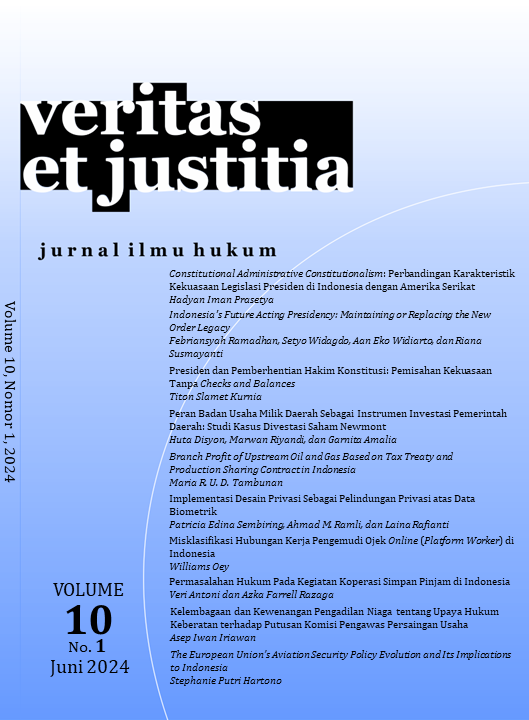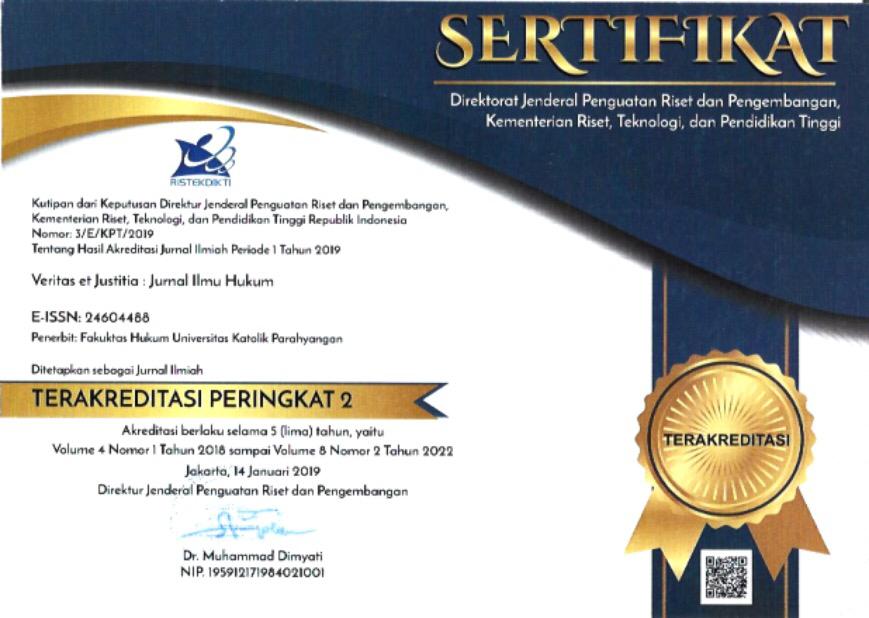KELEMBAGAAN DAN KEWENANGAN PENGADILAN NIAGA TENTANG UPAYA HUKUM KEBERATAN TERHADAP PUTUSAN KOMISI PENGAWAS PERSAINGAN USAHA
DOI:
https://doi.org/10.25123/vej.v10i1.7856Kata Kunci:
commercial court; judicial authority; objection law remediesAbstrak
Article 24A (5) of the 1945 Constitution regulates the composition, position, membership, and procedural law of the Supreme Court and subordinate judicial bodies. Initially limited to bankruptcy, postponement of debt payment obligations (PKPU), and commercial matters by Law Number 37 of 2004, the jurisdiction of the Commercial Court has expanded through other laws. This expansion raises two key issues: (1) The need for legal remedies for objections to decisions of the Competition Supervisory Commission (KPPU), and (2) The competence of the Commercial Court to address these objections. This research uses a normative juridical method, suggesting that legal remedies for objections to KPPU decisions should be regulated in a separate law, addressing decisions from institutions beyond the judiciary’s jurisdiction. The procedural aspects for contesting KPPU decisions, outlined in Article 45 of the Omnibus Law Number 6 of 2023, should first be determined within the competence of the Commercial Court as regulated by law. The current institutional arrangements and authority of the Commercial Court, as outlined in the Bankruptcy and PKPU Laws and laws on Intellectual Property Rights, should be revised through a dedicated Law on Commercial Courts. This law should define the court's structure, powers, procedural rules, and set time limits and sanctions for case resolution at both the Commercial Court and the Supreme Court.
Referensi
Buku:
Achmad Ali, Menguak Teori Hukum dan Teori Peradilan, Jakarta: Kencana Grup Media Prenada , 2009.
Aria Suyudi, dkk, Kepailitan di Negeri Pailit, Pustaka Studi Hukum dan Kebijakan Indonesia, Jakarta, 2004.
Bambang Sutiyoso, Hukum Acara Perdata dan Perkembangannya, Penerbit UUI Press, Yogyakarta, 2006.
Destivano Wibowo & Harjon Sinaga, Hukum Acara Persaingan Usaha, Jakarta: Raja Grafindo Persada, 2005.
Hadi Shubhan, Hukum Kepailitan, Kencana Grup Media Prenada, Jakarta, 2008.
Ida Nurlind, Prinsip-prinsip Pembaruan Agraria, Penerbit Rajawali Pers, Jakarta, 2009. Jimly Asshiddiqie, Perihal Undang-Undang, Jakarta, Constitution Press, 2006.
Khuzaifah Dimyati, Teorisasi Hukum, Universitas Muhammadiyah Surakarta, 2004.
Lili Rasjidi, Pembangunan Sistem Hukum Dalam Rangka Pembinaan Hukum Nasional. Termuat dalam buku Butir-Butir Pemikiran dalam Hukum, Bandung: Penerbit Refika Aditama, 2008.
MH Tirtaamidjaja, Pokok-Pokok hukum Perniagaan. Djambatan, Jakarta, 1962. Muhammad Nasir, Hukum Acara Perdata , Jakarta: Djambatan , 2005.
R Soekardono, Hukum Dagang Indonesia. Jilid I (bagian pertama). Jakarta: Soeroengan , 1963.
Retnowulan Sutantio, dan Iskandar Oeripkartawinata, Hukum Acara Perdata Dalam Teori Dan Praktek, CV Mandar Maju, Bandung, 1997.
Romli Atmasasmita, Reformasi Hukum, Hak Asasi Manusia & Penegakan Hukum, ed. Aman Sembiring Meliala, dan Agusta Takariawan dalam “Konsep Kekuasaan Kehakiman Yang Bebas, Merdeka, dan Mandiri”, Bandung, Mandar Maju, 2001.
Sjachran Basah, Hukum Acara Pengadilan dalam Lingkungan Peradilan Administrasi (HAPLA ), Rajawali Pers, Jakarta, 1989.
Sudargo Gautama, “Aneka Masalah Hukum Perdata Internasional”, Alumni, Bandung, 1985.
Sudikno Martokusumo , Hukum Acara Perdata Indonesia, Yogyakarta: Liberty, 2022
Van Apeldoorn: Pengantar Ilmu Hukum, cetakan kedua, penerbit Noordhoff-Kolff NV-Djakarta, 1957.
Jurnal:
Henri P Panggabean , MS, “Perspektif Kewenangan Pengadilan Niaga di Indonesia (dampak perkembangan hukum di Indonesia), Jurnal Hukum Bisnis, Volume 12, 2001.
Hermayuis, Kedudukan, Tugas dan Fungsi Organisasi pengadilan Niaga. Makalah disampaikan pada Workshop “Peradilan Organisasi Peradilan Niaga” yang diselenggarakan oleh CINLES, Jakarta 28-29 November 2002.
Laporan Tim Kerja Terpadu Penilaian Pelaksanaan TAP MPR-RI Nomor X/MPR/1998 Tentang Pemisahan Ketat Fungsi Peradilan dari Eksekutif (sesuai Keppres Nomor 21 Tahun 1999) tanggal 4 Juni 1999.
Perundang-undangan:
Undang-Undang Dasar Tahun 1945.
Undang-Undang Nomor 5 Tahun 1999 tentang Larangan Praktek Monopoli dan Persaingan Usaha Tidak Sehat.
Undang-Undang Nomor 37 Tahun 2004 Tentang Kepailitan Dan Penundaan Kewajiban Pembayaran Utang.
Undang-Undang Nomor 48 Tahun 2009 Tentang Kekuasaan Kehakiman.
Undang-Undang Nomor 49 Tahun 2009 Tentang Perubahan Kedua Atas Undang-Undang Nomor 2 Tahun 1986 Tentang Peradilan Umum.
Keputusan:
Mahkamah Konstitusi Nomor 012-016-019/PUU-IV/2006 19 Desember 2006.
Kamus:
Kamus Istilah Perdagangan. LP3ES, Jakarta, 1995.
##submission.downloads##
Diterbitkan
Terbitan
Bagian
Lisensi
Hak Cipta (c) 2024 Asep Iwan

Artikel ini berlisensi Creative Commons Attribution-NonCommercial 4.0 International License.
Authors who publish with this journal agree to the following terms:
Authors retain copyright and grant the journal right of first publication with the work simultaneously licensed under a Creative Commons Attribution License that allows others to share the work with an acknowledgement of the work's authorship and initial publication in this journal.
Authors are able to enter into separate, additional contractual arrangements for the non-exclusive distribution of the journal's published version of the work (e.g., post it to an institutional repository or publish it in a book), with an acknowledgement of its initial publication in this journal.
Authors are permitted and encouraged to post their work online (e.g., in institutional repositories or on their website) prior to and during the submission process, as it can lead to productive exchanges, as well as earlier and greater citation of published work.
The Journal allow the author(s) to hold the copyright and to retian publishing rights without restrictions.










